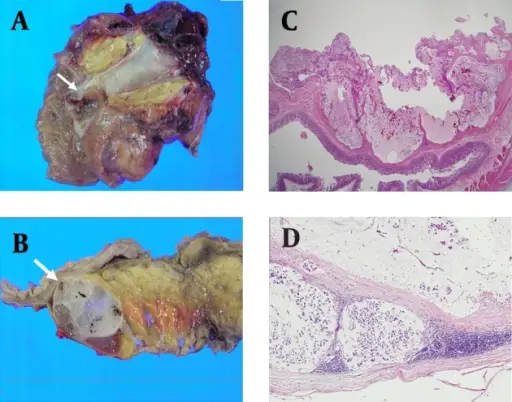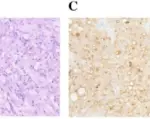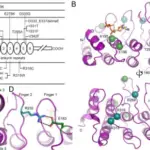Mucinous carcinomas are a rare form of invasive ductal carcinoma cancer that begins in the milk duct and spreads beyond it into nearby healthy tissue.
What is the Pathology of Mucinous Carcinomas?
The pathology of mucinous carcinomas is:
-Etiology: The cause of mucinous carcinomas is age, gender, obesity, tobacco, sedentary lifestyle, alcohol, breast density specifically for breast cancer, and unhealthy diet.
-Genes involved: TP53.
-Pathogenesis: The sequence of events that lead to mucinous carcinomas harbor a low level of genetic instability and rare recurrent amplifications, and the genomic profiles of the tumor components of mixed mucinous tumors are remarkably similar to those of pure mucinous carcinomas. More than 90% of pure mucinous carcinomas are diploid, whereas only 42% of mixed mucinous carcinoma are diploid.
-Histology: The histology associated with mucinous carcinomas shows there is a dermal mass composed of glands and solid nests of epithelial cells which appear to be floating in copious mucin. The cells are enlarged, show mild pleomorphism and often have an eosinophilic cytoplasm.
How does Mucinous Carcinomas Present?
Patients with mucinous carcinomas typically more in females mostly at age between 35 to 70 years. The symptoms, features, and clinical findings associated with mucinous carcinomas include: irritation or dimpled area of the skin, scales or redness of the skin of the breast, underarm lump swelling of the breast, pain in the breast.
How is Mucinous Carcinomas Diagnosed?
Mucinous carcinomas is diagnosed by ultrasound, MRI, or biopsy.
How is Mucinous Carcinomas Treated?
Mucinous carcinomas is treated by surgery, radiation therapy, hormonal therapy, and chemotherapy.
What is the Prognosis of Mucinous Carcinomas?
The prognosis of mucinous carcinomas is good.



